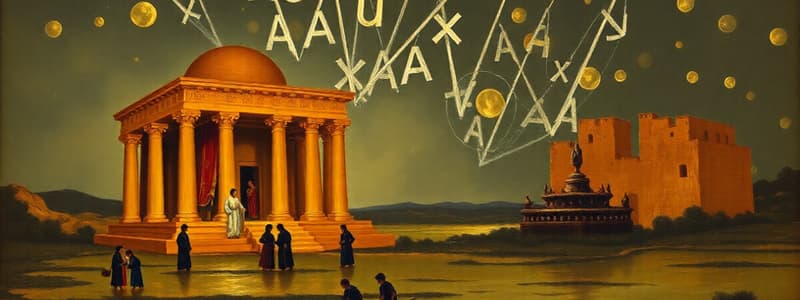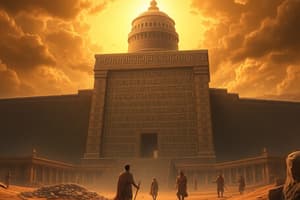Podcast
Questions and Answers
Which of the following inventions allowed the Sumerians to keep records and pass along knowledge?
Which of the following inventions allowed the Sumerians to keep records and pass along knowledge?
- Bronze tools
- The wagon wheel
- The sundial
- Cuneiform writing (correct)
What material did the Sumerians invent to create bronze?
What material did the Sumerians invent to create bronze?
- Copper and tin (correct)
- Iron and tin
- Copper and aluminum
- Copper and zinc
What factor primarily attracted tribes to settle in Mesopotamia?
What factor primarily attracted tribes to settle in Mesopotamia?
- Mineral resources
- Isolated locations
- Fertile river valleys (correct)
- Harsh weather conditions
What role did scribes hold in Sumerian society?
What role did scribes hold in Sumerian society?
What is the significance of the term 'Mesopotamia'?
What is the significance of the term 'Mesopotamia'?
How did Sumerian traders typically exchange their goods?
How did Sumerian traders typically exchange their goods?
What was the primary purpose of the Sumerians' system of writing?
What was the primary purpose of the Sumerians' system of writing?
Which civilization is NOT mentioned as part of the Sumerian civilization?
Which civilization is NOT mentioned as part of the Sumerian civilization?
What role did priests have in the Sumerian civilization?
What role did priests have in the Sumerian civilization?
Which of the following best describes the type of government in Sumerian city-states?
Which of the following best describes the type of government in Sumerian city-states?
What were 'ziggurats' primarily used for in Sumerian cities?
What were 'ziggurats' primarily used for in Sumerian cities?
What social group is NOT part of the Sumerian social structure?
What social group is NOT part of the Sumerian social structure?
How did Sumerian farmers ensure regular crop production?
How did Sumerian farmers ensure regular crop production?
Flashcards are hidden until you start studying
Study Notes
As Time Passed
- Fertile river valleys attracted more tribes to live and build civilizations because they were suitable and provided many resources
- Small tribes settled by the Nile River
- Agriculture and trading encouraged people to live in Mesopotamia
Mesopotamia Location
- The area between the Tigris and Euphrates Rivers was referred to as Mesopotamia or "the area between the two rivers"
- The Fertile Crescent extended from the Mediterranean River to the Arabian Gulf
- Rich soil helped sustain civilization
- Layers of silt enriched the soil for the Assyrians, Akkads, and Sumerians
- Farmers were able to grow crops regularly using irrigation and drainage ditches
City-States and Religion
- Mesopotamia was made of city-states
- A city-state is a large city with some surrounding area ruled by the basic units of the Sumerian civilization
- Each city-state had its own political and economic control over the surrounding countryside
- The Sumerian civilization included the cities of Eridu, Ur, and Uruk
- Each city was surrounded by walls with defense towers
- Mud was plentiful and used to build houses for peasants, officials, or priests
- Sumerians were innovative with mud bricks and invented the arch and the dome
- They were also famous for building massive stepped towers topped with temples called ziggurats
- Sumerians believed their religion was Polytheistic and obeyed and served their religion
Sumerians Believed
- The state was a theocracy
- Theocracies were governments established by divine authority
- The people contributed by devoting huge amounts of their wealth for the purpose of building more temples and houses for the priests who served the religion
- Priests were a major source of authority
- Their power was unlimited and went beyond that of the kings who ruled the city-state
- Kings led strong armies and organized workers for different irrigation projects
- They were highly respected as a source of authority
- They resided in huge palaces
The Social Groups of the Sumerian Civilization
- The nobles, commoners, and slaves
- Priests, officials, and their families were amongst the nobles
- Merchants, farmers, and other craftspeople were amongst the commoners
- Slaves were owned by palace officials
Inventions
- The Sumerians were very innovative in terms of technology
- Perhaps, their most famous invention is their system of writing
- Writing was important because it allowed society to keep records and pass along knowledge from one generation to another
Sumerian Economy
- Traditional economy depended on trade, farming, and industry
- People learned how to make their own woolen textiles, pottery, and metalwork
- Sumerian traders traveled either to the eastern Mediterranean or to the east of India where they exchanged several of their products such as barley, dried fish, and wheat for imported copper and tin
Their System of Writing
- Known as cuneiform
- Helped them in keeping records on tablets
- Cuneiform writing also helped in training scribes
- These people served as jurists, teachers, and copyists and later held important positions in their cities
- Writing also became a major icon in inventing new ways of communication
The Invention of Tools and Devices
- Made the life of the Sumerians easier
- They developed the wagon wheel, the sundial, and arch
- They were the first to make bronze out of copper and tin
- Their achievements in math and astronomy were also tremendous
- They were even responsible for the division of hours and minutes in our watches
Hints to Remember
- Cuneiform is wedge shaped writing using a reed stylus as a tool to create impressions on a clay tablet
- Sumerians measured fields and erected buildings by using geometry
- Sumerians invented the wagon-wheel for transportation
Studying That Suits You
Use AI to generate personalized quizzes and flashcards to suit your learning preferences.




